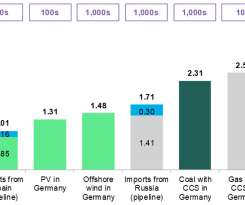BNEF, Snam, IGU report finds global gas industry set to resume growth post-pandemic; low-carbon technologies for long-term growth
Green Car Congress
AUGUST 7, 2020
After growing by more than 2% in 2019, global gas use is set to fall by around 4% in 2020, as the COVID-19 pandemic reduces energy consumption across the global economies. The report shows that medium-term growth will come from increasing cost-competitiveness and increased global access to gas. Low-carbon gas.












Let's personalize your content